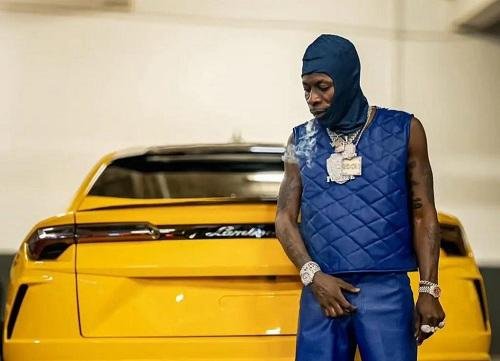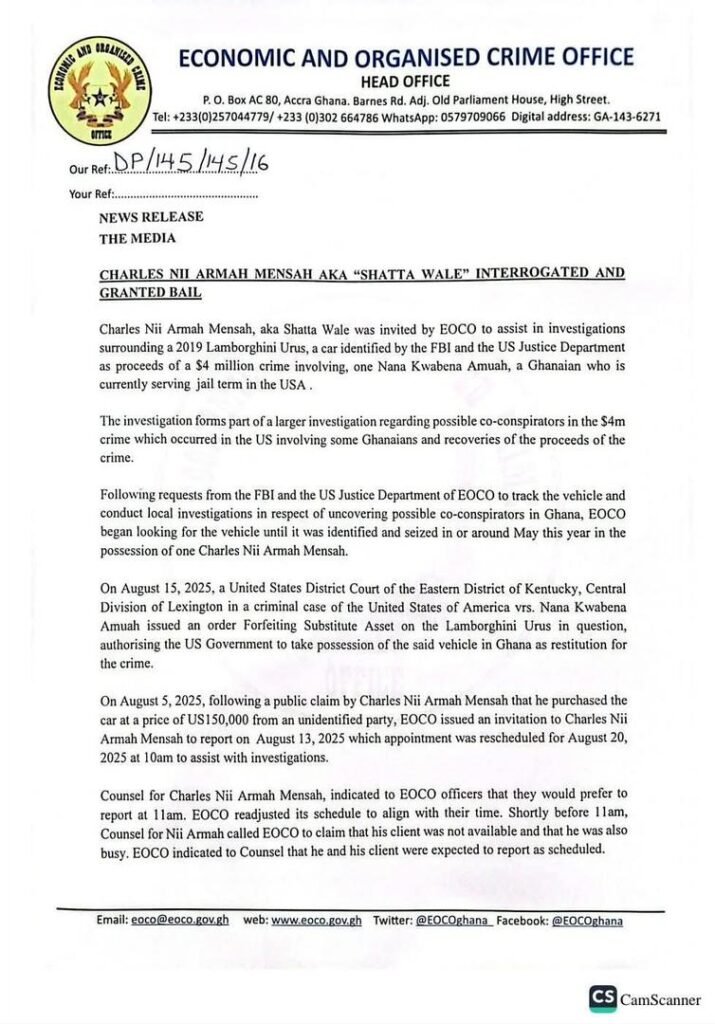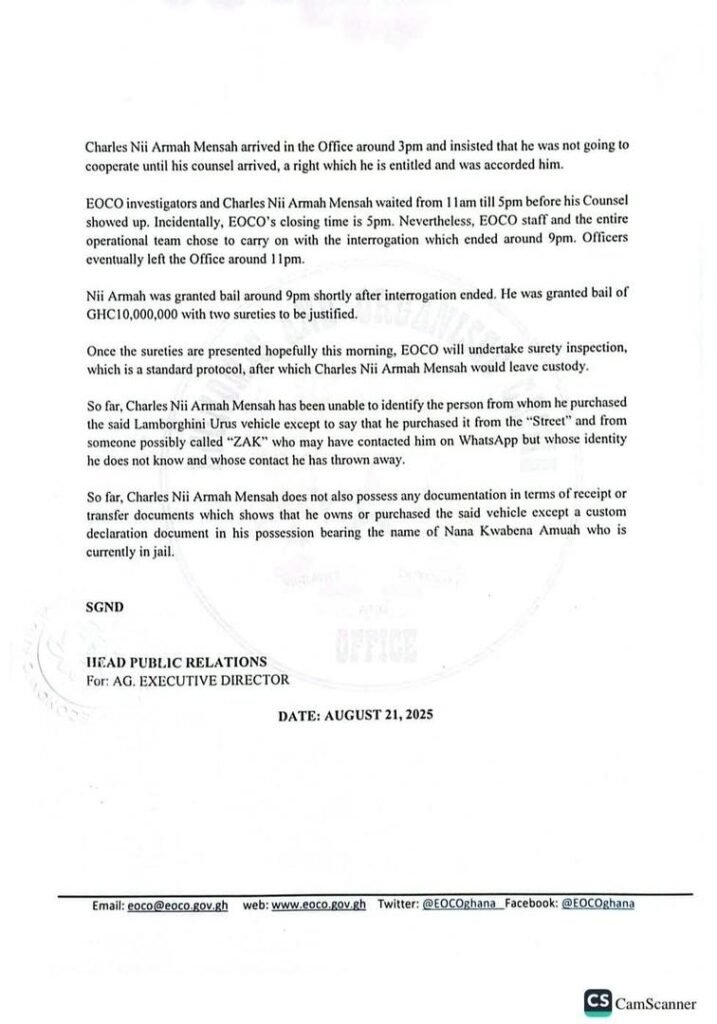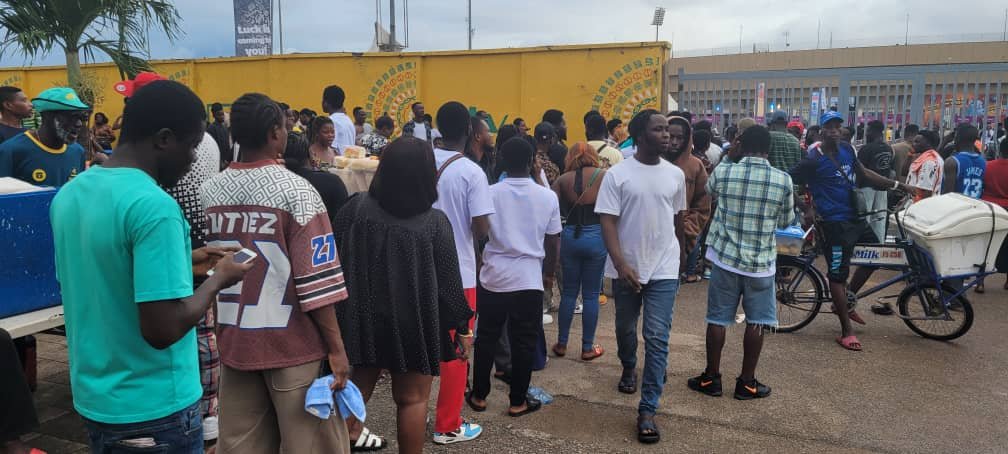Entertainment
Shatta Wale’s Lamborghini linked to FBI, US justice probe – EOCO

The Economic and Organised Crime Office (EOCO) says the Lamborghini Urus found in the possession of dancehall artiste Charles Nii Armah Mensah, popularly known as Shatta Wale, is linked to a $4 million crime being investigated by the FBI and the US Justice Department.
EOCO stated that the vehicle was identified by US authorities as part of proceeds from a fraud case involving a Ghanaian, Nana Kwabena Amuah, who is currently serving a prison sentence in the United States.
According to the statement, EOCO revealed that a US court has already ordered the forfeiture of the car to the US government as restitution.
The Office said Shatta Wale was invited to appear before investigators on August 20, 2025, after publicly claiming that he bought the vehicle for $150,000.
He was interrogated and later granted bail of GH₵10 million with two sureties.
In the statement, EOCO noted that Shatta Wale was unable to provide receipts or documents to prove ownership of the Lamborghini.
They added that he claimed to have purchased it “from the street” through someone possibly called “Zak,” whose identity he could not confirm.
EOCO explained that the only document connected to the vehicle was a customs declaration that carried the name of Nana Kwabena Amuah, the jailed Ghanaian at the centre of the US fraud case.


By: Jacob Aggrey
Join our WhatsApp Channel now!
https://whatsapp.com/channel/0029VbBElzjInlqHhl1aTU27
Entertainment
Sarkodie’s Rapperholic Concert climaxes Momo Fest 2025 in Kumasi

The Kumasi metropolis was thrown into a state of frenzy last Saturday as thousands of fans flocked the Baba Yara Sports Stadium for Sarkodie’s Rapperholic Concert that climaxed the 2025 Momo Fest.
Despite a heavy rainfall, the event, powered by MTN, drew unprecedented crowds for the month-long initiative to promote financial inclusion, the use of mobile money, and raise awareness on MoMo fraud prevention.
The musical event was preceded by educational roadshows, cashless market fairs, and community engagement activities across the country.
Vendors at the MoMo Cashless Market and Fair, set up within the stadium premises, offered goods and services payable exclusively through mobile money, giving patrons a live demonstration of MoMo’s utility.
The concert, headlined by multiple award-winning rapper Sarkodie, featured performances from several high-profile Ghanaian artistes including Medikal, Kofi Kinaata, Donzy, Kweku Smoke, and Efya.

But the appearance of Shatta Wale, who joined Sarkodie on stage, took the excitement a notch higher as it marked a rare public collaboration between the two top acts.
The event would go into the history books as one of the largest music gatherings in Kumasi and a fitting conclusion to a festival that sought to blend innovation with entertainment.
Entertainment
Daddy Lumba’s funeral rites slated for December 6 in Kumasi

Funeral rites for the late Ghanaian music icon, Charles Kwadwo Fosu, affectionately known as Daddy Lumba, will be held on December 6 at the Baba Yara Sports Stadium in Kumasi.
Later in the evening of December 6, there will be a DL cocktail party at the Rattray Park, which will feature top musicians in the country.
Announcing the funeral arrangements on behalf of the family, former Manhyia North Member of Parliament, Collins Owusu Amankwa, said the decision was reached after consultations with Manhyia, government, and other key stakeholders.
The family cautioned the public to desist from disrespecting the legend on social media by spreading falsehood about his marital status.
Daddy Lumba, 60, passed away on July 26, 2025, at the Bank Hospital in Accra after a short illness.
Following his death, a book of condolence was opened at his East Legon residence for loved ones, friends, colleagues, and fans to pay tribute to his iconic memory.
Subsequently, the government, in collaboration with the Creative Arts Agency, organised a candlelight vigil in his memory at Independence Square in Accra on August 2.
This was later followed by a One Week Observation at the same venue on August 30, which was attended by people from all walks of life.
Born on September 29, 1964, in Nsuta in the Ashanti Region, Daddy Lumba started his music career at a young age. He later joined the Lumba Brothers alongside Nana Acheampong in Germany before launching a solo career.
With about 32 albums and over 200 songs to his credit, Daddy Lumba thrilled the world with classic hits such as “Aben Wo Ha,” “Yentie Obiaa,” “Playboy,” “Theresa,” “Sika Asem,” “Mensei Da,” “Makra Mo,” and many others.
By Edem Mensah-Tsotorme














